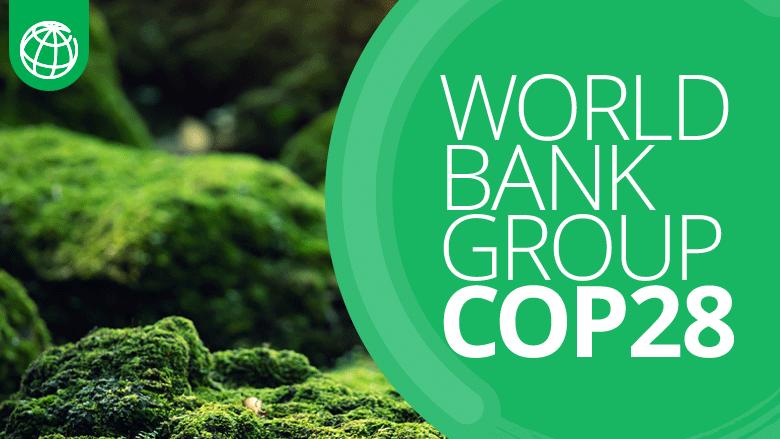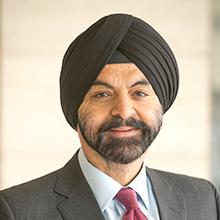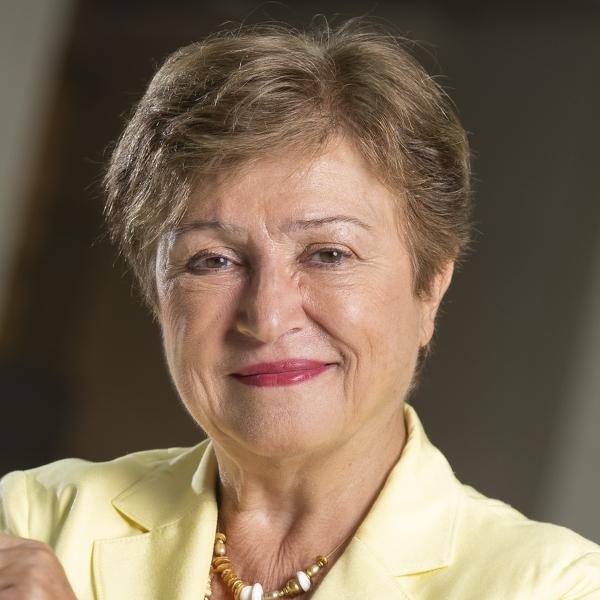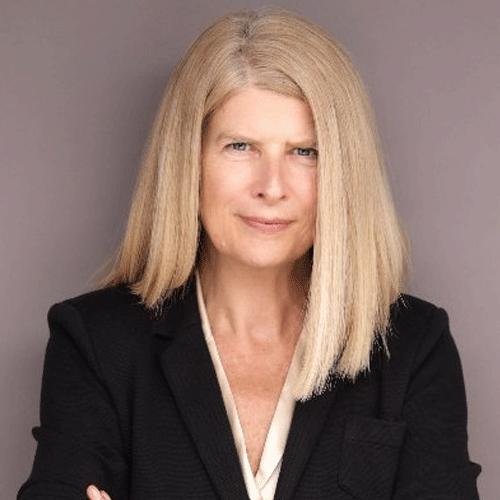[Pilita Clark] Hello to everyone in the room and to all of you joining us digitally. My name is Pilita Clark. I'm an Associate Editor at the Financial Times, and I'm very pleased to welcome you here to the World Bank Group and International Monetary Fund and FT Pavilion here at COP28 in Dubai. Joining me to open the pavilion today is Ajay Banga, President of the World Bank Group, [Audience applauds] and Kristalina Georgieva, who is a Managing Director of the International Monetary Fund. Both of you, I have a threshold question. How many COPs have you both to? Kristalina, how many is this?
[Kristalina Georgieva] Six.
[Pilita Clark] Six. Okay.
[Kristalina Georgieva] I'm sorry. I have been to six COPs, including Copenhagen.
[Pilita Clark] Okay. And Ajay?
[Ajay Banga] My first.
Pilita Clark] Your first. All right. And first impressions?
[Ajay Banga] I don't know. I've just been here the day. I landed this morning and I've been in one meeting after the other and running from one panel to the other. Ask me this after a day or two and I'll give you a better answer.
[Pilita Clark] Okay. All right. Let's plow into it. We don't have a lot of time, unfortunately. As usual, at all these events, everybody knows it's busy, busy, busy. The big headline of the COP so far has been that we have seen more than $400 million worth of commitments to the climate Loss and Damage fund that the World Bank is hosting. I wonder, Ajay, can you tell us when is the money likely to start flowing? Could you give us an idea of the sorts of projects that it's likely to be helping to support?
[Ajay Banga] Actually, I don't know either of those right now because it's very early stages for this. You know that it literally just got approved over this period. The fact that 420 million have already shown up, and I think more will come, is a good sign. The reality is the Bank is currently not planning to play the role of allocating the money. That will be done by a governing board that needs to be created that should have representation from the donor countries as well as the recipient countries. Our job is like a trustee. We run it, we operate it, we help to make sure the money goes to the right places and because we know how to do that. But we're not actually currently being seen as the people who decide which dollars go to whom and which go to whom. That could change. There are conversations going on in the countries that could change that. But currently, that is not the case.
[Pilita Clark] Okay. What's an example of the work that that money is going to be able to achieve?
[Ajay Banga] In the beginning, it's going to be all about technical assistance and analytics, first of all. That's going to be the beginning. Otherwise, 420 million is not going to take us very far in a loss and damage situation. It's really about getting the numbers established, getting the right fact base done, and move on from there. I think you should see if this gets done well, sometime next year when you'll start seeing money actually being put out to help countries on the ground. It's similar to the Pandemic Fund, if you think about it. That got created a couple of years ago, and the first lot of money has just gone out recently three or four months back.
[Pilita Clark] Yeah. Kristalina has obviously hoped that a lot more money will be flowing into the fund and into climate-related efforts more generally. The IMF has actually just released a new analysis that is showing that by 2050, low carbon investments need to be rising to around $5 trillion a year, which is about five times more than what they were in 2020. How's the world going to get there? Can you give us a bit of an update on the Resilience and Sustainability Trust that the IMF has?
[Kristalina Georgieva] Let me first say that this is the first COP when the IMF and the World Bank share a pavilion. [Audience applauds]
[Ajay Banga] With the FT.
[Kristalina Georgieva] With the FT. With the FT. The signal we are sending is that we do need to work together in a way that makes sure that what we achieve is bigger than we would have achieved each one of us on our own. Going to the money. Five trillion sounds like an impossible amount, but is it really? If you look at the world economy today, it is over $100 trillion economy. Of course, it will continue to grow. By the time we move in the decades, there should be better capacity to finance any activities. The second question we have to ask ourselves is, is it really climate investment or is it climate and development in most cases? If this is the case, then, of course, we should not be scared of this amount because investments of that size are not necessarily that significant. But then comes the question, even if we are to be more comfortable that we are not talking about an impossible, it is still a mountain to climb. The way we see the climb is to use all possible instruments we have at our disposal. We are a huge proponent of carbon price. We believe that carbon price has the potential of raising revenues in a way that is both equitable because the more you consume, the more you pollute, the more you pay. It is also an incentive to accelerate decarbonization. In other words, you would need less money because of consumption and production adapting to it. Secondly, we are finally at the cusp of moving towards private, public money genuinely giving us the impact that is necessary. No more blended finance is a term, it is a reality. You would hear people talking about various instruments in that regard. The third source of financing, frankly, is countries being more disciplined in collecting taxes from their businesses and their people. When we [signal cut off] at tax collection today, in many developing countries it is below 15% tax to GDP, which we think is the minimum you need to function. Even when it is 20%, 22%, 23%, our analysis shows that there is space by improving tax collection, especially put it on digital, nobody can hide, collect it, but also be more aggressive towards taxing those that today are avoiding taxation. It is a problem, but it is a solvable problem and our institutions would make our contribution to solving it. In our case, we have $40 billion in the Resilience and Sustainability Trust.
[Pilita Clark] Which is a new fund.
[Kristalina Georgieva] It is a new trust.
[Pilita Clark] How much of that money has actually been flowing?
[Kristalina Georgieva] We have 11 programs, of which six are to African countries. The total amount committed today is somewhere in the order of seven billion. I'm looking at Dora. How much, Dora? How much? Of committed or disbursed? Of committed. Well, sorry.
[Pilita Clark] So disbursing is a big question about this.
[Kristalina Georgieva] No, actually, it's not.
[Pilita Clark] But it has started to be disbursed?
[Kristalina Georgieva] Absolutely, we started dispersing. I'm sorry. I probably am giving you the number of 11 plus those that are moving to board. We have programs that are going to board. The short and the long is that demand is incredible, very strong. Performance is improving. We actually rely on these guys, on the World Bank, for the quality of the policy decisions that we would support. I'm actually now telling everybody we need more. Today, the Emirates announced 200 million additional for the RSD. Thank you. [Audience applauds]
[Ajay Banga] Let me ask on the topic of money. First of all, not everything requires trillions. Let's just get away from, for a minute, renewable energy is where these numbers go. If you look at methane, methane from rice paddy cultivation, methane from livestock, methane from waste management, this is not trillions that are required to bend the curve on methane. Methane is more dangerous than carbon dioxide. Methane is something you will hear us talking about over the next day or two. Less money required. Second, today we launched voluntary carbon markets for forestry. If we can get going with 125 odd million credits we think from 15 countries over the coming few years, and if we can be good at certifying those credits both for environmental quality but also social quality, meaning the majority of the money from those credits should go into going back to the communities which are relying upon that habitat.
[Pilita Clark] Just to be clear, this program that you just announced or this move that you just announced, you've been working on this for a long time, I know.
[Ajay Banga] A decade plus, yeah.
[Pilita Clark] These credits are actually going to be sold onto the voluntary carbon market.
[Ajay Banga] That's correct. This is not the compliance credit. This is beyond that.
[Pilita Clark] Okay. When you bought a flight and you buy an airline ticket and the airline says, “Would you like to offset your flight today?”
[Ajay Banga] Similar concept.
[Pilita Clark] These credits will potentially be purchasable by that airline, correct?
[Ajay Banga] By companies, by governments, by sovereigns, and the like.
[Pilita Clark] We know at the moment that a lot of those credits are actually a fairly dubious quality. But from next year, when these ones start to be sold...
[Ajay Banga] To be clear, these are forestry-related credits in countries where we've had a chance to be involved with projects there on the ground. We can do jurisdictional audits to ensure their environmental cleanliness. We can do social audits to ensure the money goes to communities. That's the idea of better-quality credits. Verifiable.
[Pilita Clark] People should be able to buy a World Bank-approved credit on the voluntary carbon market and know that it's going to be…
[Ajay Banga] My hope is that's what will create better pricing over a period of time.
[Pilita Clark] Because on your point, Kristalina, about the carbon pricing, we, at the FT, are huge supporters of the carbon price. However, the global average carbon price, as you know, because your figures, you put it out every year, it's gone all the way up to 6 dollars a ton of carbon.
[Ajay Banga] Some of them are a buck. There's also a buck a ton.
[Pilita Clark] Okay, but the average…
[Ajay Banga] The average is 5 to 6.
[Pilita Clark] Right. The IMF has already shown that it needs to be about 85 dollars at least by 2030. How in the world is actually... I can see that this is going to help, but really, we haven't got much hope of getting to 85 dollars a ton, have we? By 2030, do you think?
[Kristalina Georgieva] Look, it is not going to happen if we give up. That I know. We have to persevere and we also have to work with countries so they can make their choice of carbon price. Is it tax? Is it trade? Or is it standards and regulatory compliance that implicitly leads to an increase of carbon price? I think we should be less ideological and more focused on what is in for me. Why would the country do it? There the evidence is now very strong. Countries should do it. First because it is practical. They cannot get out of trouble by borrowing money. We calculated that if you fund this only by borrowed money, you're broke. That would increase by 50%. Not possible. Secondly, because it brings revenues. Thirdly, because you have incentive to change behavior. Four, there is in carbon pricing consistency over time. Today is five, tomorrow is six, the day after tomorrow… so there is that continuity. Last but not least, as I said in the beginning, it's equitable. My guys who worked on that. If you take this word that I use, you would get price.
[Pilita Clark] Okay, all right.
[Ajay Banga] I want to be clear on one thing on carbon. There's carbon pricing for domestic markets, which is aimed at changing consumer behavior or spending based on the cost of what they're consuming. Then there's these voluntary carbon markets, which for me is the best way to move money from the developed world to the developing world. The developing world has an abundance of natural resources, forest, sun, wind. This is a way to move the money. To think that you're going to move it by taxing a democratic country somewhere and hoping the money will show up in another developing country, I don't think that's going to work. Voluntary carbon markets are key to this idea. They won't be easy. I don't know if they'll scale to the level we need by 2030, but if you don't do it, no one else is going to do it. It really needs to happen.
[Kristalina Georgieva] Just to be clear, 10 years ago, the coverage of carbon price was meager. It was 10%. The price was much lower. We are moving up. I would urge all of us, when we work with policymakers, to hammer it in their brains that without carbon price, we simply cannot achieve the 1.5-degree target.
[Pilita Clark] Yeah. I want to give people in the room a chance to ask a question. If you do have a question, just raise your hand. I'm going to take probably two at a time. I think we have a microphone. Do we have a microphone somewhere? Would you mind just saying your name and where you're from?
[Amanda Ellis] My name is Amanda Ellis from New Zealand. I was at the World Bank. I ran the World Bank President's Global Private Sector CEO Forum for Women's Economic Empowerment. So pleased to see you now have something for climate. Fascinated to see the climate change development reports. But even more fascinated to see the work that you have done on subsidies, Kristalina, and I've heard you speak about it. You haven't mentioned the $7.1 trillion in fossil fuels subsidies. That dwarfs the need for renewables.
[Kristalina Georgieva] Five trillion. Yes. I'm sorry, just to disaggregate, 7.1 trillion of this today, 1.3 trillion is direct fossil fuel subsidies, which is absurd. But the rest is really carbon price, not pricing carbon. Thank you. You were very helpful.
[Ajay Banga] I would say one thing on... You've heard me talk about subsidies. I believe that some of these subsidies on fossil fuel and on agriculture and fisheries may well be justified in certain circumstances in countries. If you're getting somebody cooking gas at a cheaper price than what they would use otherwise to burn wood or coal, I would do that every day. But these the issue is, can you redirect the subsidies? The EU took 60 billion of fertilizer subsidies to farmers, which were incenting them to use more fertilizer, which ran off into the water. The same 60 is now going to incent them to use less fertilizer. There are intelligent ways to repurpose these subsidies so we can get to the end goal we are trying to get to.
[Pilita Clark] That's a very interesting example. I don't know how many millions or billions of dollars’ worth of examples there are like that, but it is very interesting. Gentlemen at the back there, yes. Oh, whoops, careful of the camera there. If you could just state your name and where you're from, thanks.
[Majid] Hi, I'm Majid from Indus Consortium Pakistan. In a recent letter, the World Bank said, and I quote, “The World Bank Group's goal is to ultimately end fossil fuel use as countries accelerate towards low carbon development and climate resilient growth.” My question is could you please elaborate what that ultimately means? Because it could mean two years, it could mean 200. It could mean two years. Could you please elaborate what…? The statement from the World Bank is “The World Bank Group's goal is to ultimately end fossil fuel use and as countries accelerate towards low carbon development.” Thank you.
[Pilita Clark] Okay, good question.
[Ajay Banga] Yeah. I would tell you that I certainly do not believe that it's two years from today, so that's a very hopeful question, but I don't think that's the case. What I believe in is that countries who are needing to provide better access to energy and electricity for their citizens are going to need to get it at an affordable and accessible price. We have to have transition pathways and we also have to provide for these countries. Africa has 600 million people without electricity. We have just approved a 15 billion, 5 from us, 10 from mobilizing a pilot into Africa, our whole project in Africa, in Eastern Africa, Where we are going to put all that to work for 100 million people to get access to electricity using solar and advanced grids. You can do it, but that's not a two-year, five-year thing. I am [unintelligible]. I've been here six months. If I knew the answer of when I could end fossil fuel, I would have been here 15 years ago. Sorry, but I'm not going to be able to give you an answer. I know where I'm going. I know I'm going to increase the mix of renewables. There's a whole effort going on in this COP to treble the level of renewable energy installation, and I think that's the right way to think about it. But just remember, climate change is not just energy emissions. For people in the Global South, climate change, you are from the Global South like I was, for people in the Global South, climate change is rainfall, soil degradation, loss of biodiversity, all those things. We have to focus on both things. Otherwise, we will only be doing one part of what's required in climate change. [Audience applauds]
[Pilita Clark] I know both of you have some anxious advisors who need to get you to your next meeting, but I just wonder if I could elaborate because as you know at this COP, as at the previous two, to follow on from that question, there's going to be a big discussion about whether fossil fuels should be phased out, phased down, unabated. What would make the World Bank Group and the IMF's job easier? Would it make your job easier if this COP agreed to something as simple as fossil fuel should be phased out?
[Kristalina Georgieva] The IMF doesn't do project finance, but your question is very relevant to us because we advise countries on policies. When we advise them on policies, today we have an obligation that is vetted by our board to include climate policies in the mix. If a country is a transition country, in other words, it has a big fossil fuel sector, we are mandated to help them see how they can get out of it in the most effective, economical, but also fastest way. If there is a decision, as we are all committing at this point to end, whatever the point is, then we will have to crank the numbers and say, “Well, this is your path if you are to get out of it.” When we look at mitigation efforts, again, our job is to give countries best policy advice. You wouldn't be surprised; we go into first and foremost price carbon. But then we also look at what else they can do to be more effective. For the World Bank, of course, for Ajay, it’s relevant also from the perspective of the World Bank's portfolio, and I'm sure that the Bank would be taking the decisions of the membership very, very strictly to heart.
[Ajay Banga] We have made a commitment to do 35% of our financing [no signal, cuts out] climate-related by 2025. We've gone past it. Today I announced we're going to go to 45% by 2025. That's 40 billion dollars a year, half into adaptation, half into mitigation, for exactly the reason that I was answering that gentleman's question.
[Pilita Clark] And by climate-related, what does that mean?
[Ajay Banga] To me, it's not just energy and renewable energy, but it's also things like nature and soil and degradation. Your question is a really good one. You asked it in a very interesting way. Would my life become easier if there was clarity that we were going either to phase out or phase down? Right now, the clarity is it's phase down. I have that clarity. Your real question is, what if they changed it to phase out? That's a different question. If you ask me the correct one, I'll answer the correct answer. The phase down, I have clarity on. We are working towards it. I believe the practical aspect of phase down requires the mix of renewables and fossil fuel to change over time. The reality is you need baseload factors in almost every country in order to load on renewables on top. Baseloads come from either hydroelectric, geothermal, nuclear, or good old-fashioned natural gas, or God forbid, coal. That's the problem. I think we have to be a little thoughtful about what we mean by phase out and phase down. I think the right thing to do is to aggressively go for phase down with a transition plan that allows for things to be done practically. I think if there was an aggressive target, more technology would go into developing renewable batteries and the like of the capacity that could hold these charges for longer. A lot of work needs to happen before we can declare victory on the ability to completely shut down fossil and only go renewable. Just remember, climate change, even if we fix renewable energy, we have to figure out agriculture and methane and livestock. We have to figure out construction materials. We have to figure out heavy transportation, and we have to figure out carbon capture. We shouldn't allow our discussion to only be on one item. Climate is a complicated topic that requires complicated thinking. It's not that simple.
[Pilita Clark] Just on carbon capture…
[Ajay Banga] But you have to be ambitious. That's all I'm saying.
[Pilita Clark] Right. A lot of people are concerned that if the decision at the end is basically supporting a phase down of unabated fossil fuels, that that will…
[Ajay Banga] I understand. That's the trade-off. I understand the issue. The issue is, so what? That's a great discussion to have. The reality is, so what? My view, I've looked at some scientific reports that say that you could, if you aren't able to solve for all these energy, agriculture, transportation and construction, you may still need carbon capture in a relatively active way for 2050. My approach is don't use that as an excuse to not change the mix of renewables to fossil fuel. That's a disaster. But let's not close our eyes to what needs to be done because we probably need to walk and chew gum at the same time. [Audience applauds]
[Pilita Clark] Okay. All right. On that note, thank you both very much. It's been a great pleasure. I don't think I can move from my chair because I think I'm tethered here. Thank you very much. Thank you very much. I'll just say we'll be seeing everybody here in this room at the pavilion for the rest of the COP, so do please join us. Thank you.





